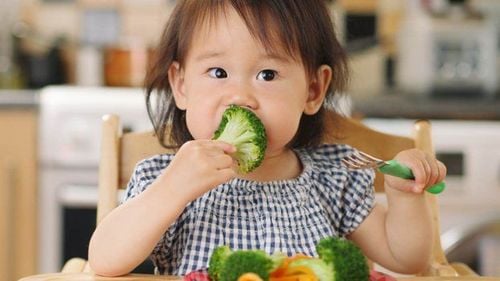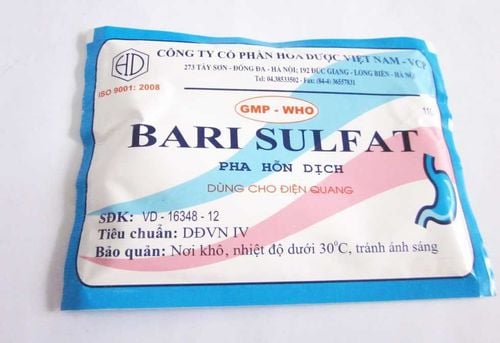This is an automatically translated article.
Constipation is quite common in children. The effect of constipation is making children tired, bloated, stomachache, leading to anorexia, slow weight gain, even malnutrition. Therefore, caregivers need to find out the cause and have appropriate treatment.
1. How does constipation in children manifest?
Constipation in children is a condition in which a child has too few stools with a solid and dry nature, or the interval between two bowel movements is too long. Symptoms of constipation are not the same for every child.
Most children will have a bowel movement 1-2 times a day. Some other children may take 2-3 days to have a bowel movement, for children who cannot apply the standard of bowel movements less than 3 times a week is constipated like adults. If the baby has only had a bowel movement for 3 days, but the stools are normal, not dry, and the stool is easy, this is the child's normal bowel habit. As for the children who have the habit of going to the toilet every day, but naturally 2-3 days before they go, you need to pay attention to whether the child is constipated.
Signs that a child is constipated include:
Children are lazy to eat, eating less than usual is one of the signs and effects of constipation. Children often have to push more when going to the toilet, their face is red, they sweat, even cry because of the burning pain. The stools are often dry, hard and have many cracks on the surface of the manure or the manure is loose like goat manure. Due to the hard and large stools, it will rub against the anus to form cracks that cause pain and bleeding. When touching the baby's belly, it will feel hard and tight because the food after digestion is not eliminated from the body. In addition, signs such as bloating, indigestion, or bad gas are the effects of constipation in children.

Trẻ lười ăn là một trong những dấu hiệu và ảnh hưởng của bệnh táo bón
2. What causes constipation in children?
Most children with constipation are caused by diet and activities. In addition, the fact that children are sedentary, do not have the habit of going to the toilet every day are also factors that promote constipation to progress.
Because children have a number of diseases such as hypothyroidism, congenital hypertrophy, anal fissures,... In addition, when children take certain cough and fever-reducing medicines, they may also experience constipation. Moreover, when sick, children often lose their appetite. This makes the child eat less, the small amount of food will not be enough to make stool. Refraining from having a bowel movement is the most common cause of constipation in children. The longer the child waits, the longer the stool stays in the intestines and the larger it is, the more difficult it is to pass stools. As a result of this condition, the child may develop chronic constipation. Sudden introduction of solid foods to infants, especially for the first time, or weaning (a baby loses water supply) can also cause constipation. The different protein composition in formula is often difficult to digest and can make the intestines absorb more water. When the water is completely absorbed in the intestines, the stool will be dry and difficult to pass. A low-fiber diet can also make your baby constipated. Fiber helps form stools in the large intestine. If children eat less fiber, not eating enough nutrients will lead to prolonged constipation.
3. How does constipation affect children's development?
Constipation if not handled early and properly will affect the health of children. The most noticeable is anorexia and malabsorption.
When constipated, stool will accumulate in the digestive tract of the child, unable to escape, causing bloating, flatulence, making the child lose appetite, anorexia, indigestion, gradually leading to anorexia. eating, malabsorption. Therefore, children are at high risk of malnutrition, affecting their physical and intellectual development.
Constipation not only affects a child's ability to develop, but also causes a number of other health problems such as:
Anal fissure: Severe constipation in children makes stools harder, children will have to use more more force to push the stool out, there is a risk of cracking or tearing the anal canal. Anal fissures cause pain, discomfort, bleeding... every time you go to the toilet. Not only that, an anal fissure can lead to infection from the stool and cause an abscess between the two sphincters or a perianal abscess. Or it can lead to anal fistula, a disease that is difficult to treat medically and often recurs. Intestinal obstruction: This is one of the effects of constipation on children. When the colon stores a large amount of solid stools for a long time, it will cause semi-obstruction or intestinal obstruction. When your child has symptoms such as intermittent abdominal pain, abdominal distension, the child can't smell or have a bowel movement, feels solid in the abdomen, you should immediately think that the child may have an intestinal obstruction. Children should be taken to the doctor immediately. Hemorrhoids: Long-term stagnant stools in the rectum interfere with blood circulation here. Over time, causing hemorrhoids and rectal prolapse. Therefore, you should regularly pay attention to the condition of bowel movements and the nature of the child's stool so that you can promptly detect and have a quick and effective remedy for constipation.

Bệnh trĩ là một trong những ảnh hưởng của bệnh táo bón đến trẻ em
4. How to treat constipation in children?
Maintain a scientific diet: When your child is constipated, the first measure you need to think about is to increase the amount of fiber for your baby. In addition to adding fiber in the main meal, you should also give your child fruit smoothies/drinks, do not drink juice because most of the fiber will survive on the flesh of vegetables. Give children enough water every day, suitable for each age: Children from 0 to 6 months old: Breast milk or formula prepared according to instructions contains enough water content needed for children in this period. Children from 6 to 12 months old: In addition to giving your baby milk, after each meal you should give your child about 2 tablespoons of filtered water. Children over 12 months old: The minimum amount of water children need to drink is 400ml/day. For children to exercise regularly: For babies, you let them practice gentle hand and foot movements. For older children, you should encourage them to participate in outdoor activities or sports, avoid letting them sit for too long in one place. Supplementing beneficial bacteria for the digestive tract: The addition of beneficial bacteria, micronutrients and beneficial minerals such as zinc, amino acids, lysine, taurine, vitamins B6, B12,... found in yogurt, food Daily and probiotic preparations will help children have a healthy digestive system, restore the intestinal microflora balance, help stabilize the digestive tract, and minimize constipation. You should take your child to the doctor when the child has symptoms such as pain in the anal region, anal fissure, hemorrhoids accompanied by symptoms such as loss of appetite, fatigue, weight loss, fear of cold, fever, bloody stools, etc. ..
To prevent and reduce constipation in children, in addition to increasing fiber-rich foods into the diet, you can supplement natural fiber for children with supplement products. You should pay attention to choosing products with fiber ingredients including short-chain fiber that dissolves quickly and absorbs nutrients and long-chain fiber that nourishes the intestinal flora.
Besides, your baby needs to add necessary micronutrients such as: Zinc, selenium, chromium, vitamins B1 and B6, ginger, acerola fruit extract (vitamin C), ... to improve taste, eat delicious, reach the correct height and weight and exceed the standard, have a good immune system, strengthen the resistance to get sick less often and have less digestive problems.
The improvement of symptoms can take place for a long time, so it is recommended that parents be calm and persistent when supplementing with nutrients for children, even through eating or functional foods. In particular, the use of functional foods should choose those of natural origin that are easily absorbed, do not allow simultaneous use of many types or continuously change the types of functional foods.
For more nutritional knowledge and child care for each age, parents should regularly visit the website vimec.com and make an appointment with the leading doctors, pediatric and nutrition experts of the National General Hospital. Vinmec when needing advice on children's health.













